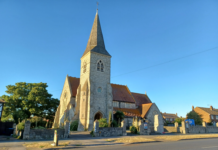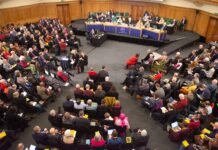The Archbishop of Canterbury has spoken of his hopes for the historic “pilgrimage of peace” to South Sudan he will be making with Pope Francis and the Church of Scotland Moderator, saying that God has “not forgotten” the country.
The three leaders are making the unprecedented ecumenical visit from 5-7th July to urge peace and solidarity in a nation that continues to suffer the effects of civil war. The joint visit by leaders of Roman Catholic, Anglican and Reformed traditions is the first trip of its kind.
During the visit the Christian leaders will lead a large open-air prayer vigil for peace, which will bring together people from across the country to pray for God’s guidance and for reconciliation.
They will also visit an internally displaced persons camp, where they will speak and pray with people who are directly affected by the conflict, which has claimed 400,000 lives and displaced over four million people.
The visit was promised during a spiritual retreat held at the Vatican in 2019, attended by the Archbishop and the Moderator of the Church of Scotland. The spiritual leaders implored South Sudanese leaders to make peace for their people and the future of their country.
During this pilgrimage the Pope, the Archbishop and the Moderator will meet the President and five Vice-Presidents to reflect on the commitments made at the Vatican retreat and to encourage them to “Seek that which unites. Overcome that which divides.”
The Archbishop of Canterbury, Justin Welby, said: “I greatly look forward to this historic pilgrimage of peace to South Sudan with my dear brothers in Christ, Pope Francis and the Revd Dr Iain Greenshields. We hope to stand in solidarity with the people of South Sudan in their great struggles. We hope to support and encourage the continued unity of churches for the good of the nation. And we hope to encourage political leaders to pursue peace in this remarkable country.
“We pray that the symbolism of our joint visit will show that reconciliation and forgiveness are possible – and that relationships can be transformed. We come as servants and disciples following the call of Jesus Christ to be peacemakers. God has not forgotten South Sudan. At the Vatican retreat in 2019, we saw the hope that is possible when people see the image of God in one another – and he never turns away from that hope. Please pray for this visit, for those who will join us and those we will meet, and please pray for South Sudan and her people.”
Speaking to members of the Anglican-Roman Catholic International Commission at the Vatican recently, the Pope said: “I wish to recommend to your prayers an important step. Archbishop Justin Welby and the Moderator of the Church of Scotland, two dear brothers, will be my traveling companions when, in a few weeks’ time, we will at last be able to travel to South Sudan. Ours will be an ecumenical pilgrimage of peace. Let us pray that it may inspire Christians in South Sudan and everywhere to be promotors of reconciliation, patient weavers of concord, capable of saying no to the perverse and useless spiral of violence and of arms.”
Dr Greenshields said: “I am genuinely humbled at the opportunity to assist our brothers and sisters in South Sudan in the search for peace, reconciliation and justice. It is a privilege to be joining the Holy Father and the Archbishop of Canterbury on this historic Pilgrimage for Peace and we come as servants of the Global Church. We call on all people in South Sudan to give expression to Jesus’ words that ‘Blessed are the peacemakers for they will be called the children of God.’
“The Church of Scotland has been invited to represent the Presbyterian family due to our strong partnership with the Presbyterian Church of South Sudan. We have been working closely together since 2015 on a vital peace, reconciliation and conflict resolution programme. It has helped local church leaders work at both a grassroots level and political level to try and bring unnecessary conflict to an end and build lasting peace, stability and unity in the country.
“There is still much work to do and the symbolism of this historic ecumenical visit sends out a very strong message about our steadfast commitment to helping the people of this country flourish for the good of all.”



